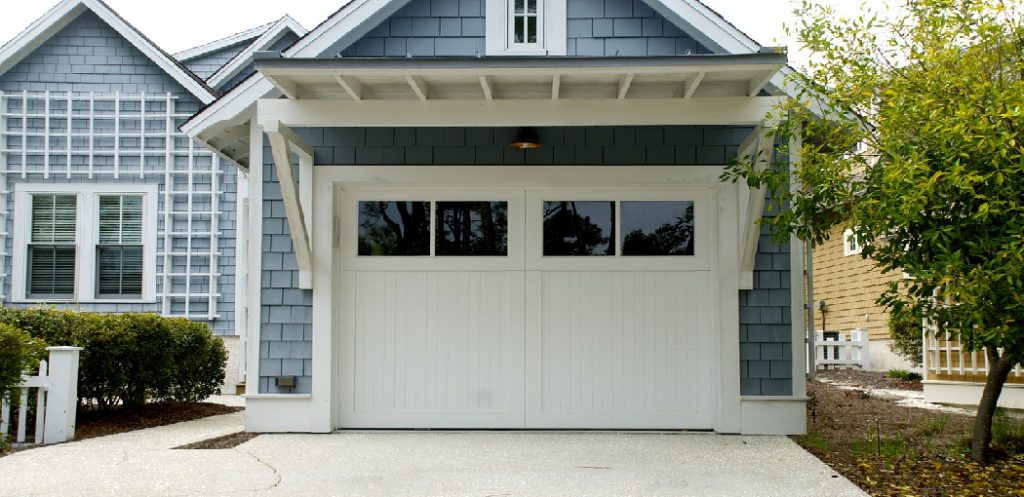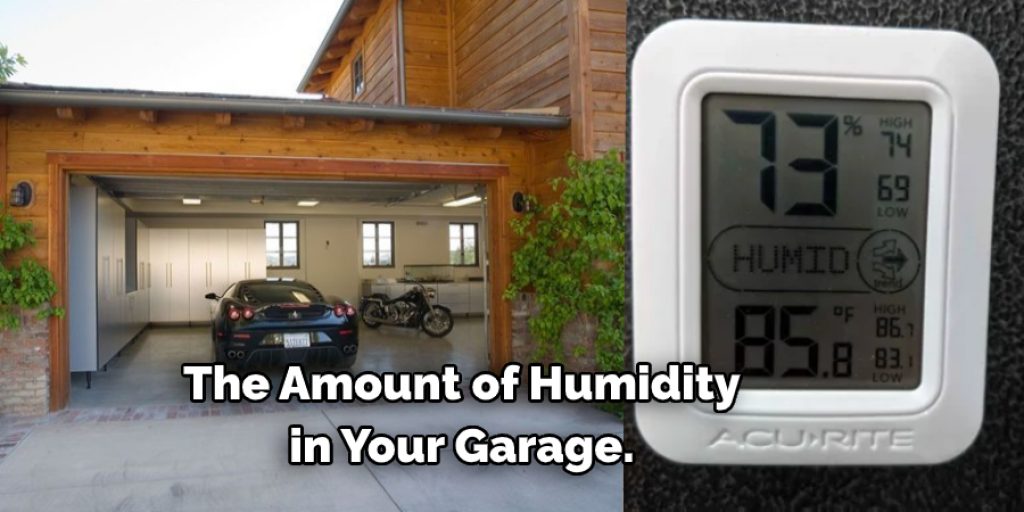How to Reduce Humidity in Garage
Did you know that humidity can damage your car? It’s true! When the air is humid, the water vapor in the air will condense on surfaces like your windshield or paint. This causes an uneven surface and corrosion of metal.
The humidity in your garage can cause you to experience some unpleasant problems. It could be that the humidity is causing your moldy food, or it could be that it’s making your paint job look dull. Whatever the issue might be, there are ways to reduce this problem and keep things running smoothly. We’ll show you how to reduce humidity in garage with a few simple tips!

Why You Should Reduce Humidity in Garage:
1. Reduce Risk of Mildew Growth:
Humidity is not the only thing that causes mold and mildew to grow, but it is a significant factor. Reducing humidity will slow the growth of these problems.
2. Reduce Risk of Corrosion:
The humidity levels play a major role in the corrosion process. When the humidity is high, the rate of metal corrosion is also high. However, by removing as much humidity as possible, you can slow down and reduce this damaging process.
3. Enhance Lumber Quality:
The humidity in the air can cause the wood to swell and become uneven, resulting in lower quality pieces. If there is less humidity, the wood is less likely to swell and is more uniform, making for better carpentry.
4. Improve Paint Job:
Humidity causes paint to clump up, creating an uneven appearance, leading to chipping of the paint. By reducing humidity, you can create a better quality paint job.
5. Improve Wood Finish Appearance:
When wood is exposed to high humidity, it can swell and shrink, causing the finish to look poor. By removing humidity, you can help prevent this from happening and keep your wood finish looking its best.
6. Extends The Life of Tools:
Tools such as saws or chisels become dull quickly when used on high-humidity materials. By reducing humidity, you can reduce the oxidation process and allow your tools to last longer. If you plan to use your tools for a longer period of time, however, it’s best to store them in an airtight container.
7. Reduce Saw Blade Damage:
Humidity causes wood fibers to swell, causing them to break or shatter when cut with a saw blade, resulting in damage to the blade and the splintering of the wood surface. Without humidity, these problems are less likely to occur, and the saw blade will last longer.
8. Reduce Surface Cracking:
When humidity increases, so do the rate of surface cracking due to fluctuations in temperature. Without humidity, these problems should be reduced or eliminated since they usually happen due to moisture exposure.
9. Enhance Drywall Appearance:
Humidity causes drywall to absorb moisture that darkens the appearance of the finished surface. Without humidity, it is less likely that these problems will occur and your drywall should look better.
10. Keep Your Car in a Healthy Condition:
Humidity is also the by-product of the combustion process. When humidity levels are high, it can seep into your car’s air intake vents which may cause water to drip into the vehicle’s electronic system causing major damage. Without moisture in this form, you’ll avoid these problems.
You Can Check It Out to Insulate a Detached Garage
10 Methods on How to Reduce Humidity in Garage:
Below we have discussed ten effective methods that will help you on how to reduce humidity in garage. So be sure to follow any of these methods.

1. Fix your roof leaks:
If you have a roof leak, it usually means something wrong with your gutter system or shingles. You can try to fix the problem yourself by using waterproof sheets on the inside of the ceiling, but don’t forget to check if all nails are secure enough so it doesn’t fall and cause damage to your garage!
2. Use a dehumidifier:
A dehumidifier is an appliance that collects water vapor from the air. It’s spent on electricity, but it also has some advantages since it doesn’t require any special skills to install and use. It is usually beneficial, especially in garages where there are machines that drip water.
3. Use a ventilation fan:
A ventilation fan creates cross-draft ventilation inside your garage, allowing the hot air to escape through an open window or door. If you don’t have windows or doors on opposite walls of the room, you can still use the fan by insulating the floor, walls, and ceiling with an insulation board. The disadvantage of this method is that it doesn’t remove humidity efficiently.
4. Open the windows:
If you have a door in the garage that goes outside, open it and let some fresh air inside. You can use a fan to blow out all of the hot air. If you don’t have windows on opposite walls, try opening one window for cross ventilation. If possible, remove all of your stored items from on top of your workbench and cover them for the air to circulate more easily around the room.
5. Check the drainage:
If you have water leaking from your downspout, replace any broken or missing gutters and clean the ones that are still in good condition. You should also check for leaks on the side of your house and fix cracks and holes in the foundation.
6. Hose it down:
Cover your car with a car cover when it’s not in use, or wash it regularly. You can also hose down the floor to keep it clean and stop dust from forming in the garage.
7. Adjust the temperature:
Adjust the temperature of your central heating system if it’s too hot or cold inside. The heating and cooling systems create humidity, so make sure to turn them off when not at home. Otherwise, ensure that they’re working efficiently by calling a professional service.
8. Install a ventilation system:
If you have a central air conditioning unit, install a ventilation kit to avoid getting trapped inside the cooler air. This will reduce humidity and create a more comfortable environment for your garage.
9. Stop using your heater:
Don’t use an electric or gas-powered heater to reduce humidity. If you have one, use it only when necessary and try to keep the garage door closed while it’s on to stop humidity from seeping in.
10. Keep the area clean:
Clean up any spills immediately and make sure to sweep or vacuum regularly to prevent dust from forming. If dust particles accumulate, they will reduce the humidity in the garage and make it easier for your equipment to operate.
You Can Check It Out to Cool a Garage With No Windows
Some Tips and Suggestions:
Here we have given some tips and suggestions on how to reduce humidity in garage.
- Do not use dehumidifiers when the weather is hot and humid outside, like in summer.
- When dehumidifiers are not in use, wipe the condensate pan clean and dry it out to remove any water collected.
- If you live in a coastal area or somewhere already humid, do not add more humidity into your house by using a dehumidifier.
- If you live in a place with humidity, but not much airflow, install an exhaust fan and leave it on while using the dehumidifier. This will help circulate air and help reduce humidity faster.
- The type of dehumidifier that works best at high humidity levels is the compressor type.
- If you choose to use a desiccant dehumidifier, keep it in the area and do not move it around because these types of dehumidifiers work best when stationary.
- If you want to place a dehumidifier in your garage or somewhere with high humidity. These are much more efficient than the desiccant type.
- If you have children, pets or are worried about your dehumidifier being accidentally turned off, plug it into a power strip that can be turned on and off with a switch.
Will a Fan Help With Humidity in Garage?

No, a fan will not do much to reduce the amount of humidity in your garage. Standard heat-driven fans use electricity or gas to create mechanical energy that sets air molecules into motion. Unfortunately, all the moving air takes heat away from its surroundings, making it feel cool on our skin. So the cool air is moved out of the way so the heat can be taken away.
If you have a fan that creates a wind-chill effect, it’s moving cold air into your space, and for this reason, it can help with humidity control. A lot of people believe that water molecules are responsible for humidity in the air. But, they’re simply taking up more space than most of the other molecules in the air.
When water vapor is added to the air, it becomes more difficult for your body to remove heat through sweat evaporation because there are so many particles moving around and bumping into each other. This makes humidity feel hotter than dry air.
A fan would lower humidity by increasing airflow with a heat-driven fan or blowing away cold air with a wind chill effect. However, it cannot reduce humidity because it is not removing any moisture from the air.
Conclusion:
There are many ways to reduce the humidity in your garage. Of course, the best way is by adding a dehumidifier and opening windows for ventilation. Still, there are other less expensive options, such as heating or cooling it with an air conditioner or heater.
We hope that this article on how to reduce humidity in garage has been helpful and informative! However, if you have tried all of the above methods and your garage is still humid, you may need professional help with dehumidifying the garage to reduce humidity.




